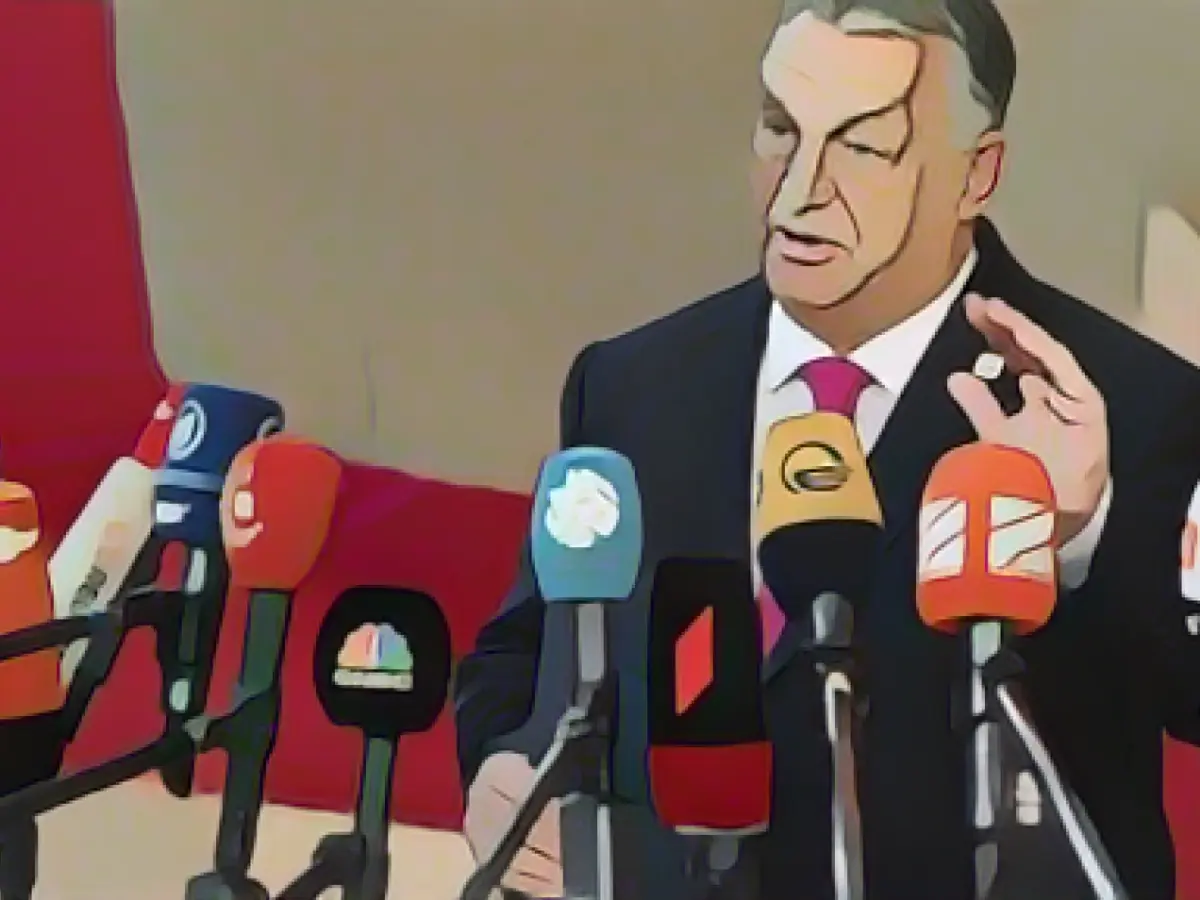Ukraine aid: Europeans want to break Orban's veto
"Now is not the time for half measures," said Selensky during a video link with Europe's heads of state and government. If the summit fails, Russian President Vladimir Putin will acknowledge this with a "satisfied smile".
The two-day summit is about an aid package of 50 billion euros to save Ukraine from economic collapse. In addition, the starting signal for accession negotiations with Ukraine and neighboring Moldova is planned.
However, Orban, who is considered to be close to Russia, is standing on the brakes: the right-wing populist said in Brussels that there is no hurry when it comes to aid for Kiev. At best, he was prepared to provide funds outside of the EU budget, which would not commit Hungary to anything. The other 26 member states reject this because the EU would then no longer have a united stance towards Russia.
Orban also rejected Zelensky's request for accession negotiations: "There is no reason to discuss anything, because the conditions have not been met," he emphasized. The President of the European Parliament, Roberta Metsola, disagreed: "This is not about a fast-track procedure" for Kiev, she said after a debate with the heads of state and government.
German Chancellor Olaf Scholz (SPD) supports the Ukraine aid and called on all summit participants to reach an agreement. Scholz, French President Emmanuel Macron and EU Commission President Ursula von der Leyen had sought a solution with Orban in a small circle before the summit. However, there were no signs of a compromise for the time being. The decisions in favor of Ukraine require unanimity, giving Orban a right of veto.
Unfortunately, the result is a picture of 26 member states against one, said Dutch Prime Minister Mark Rutte. "But we are not sitting here to offer Orban something." Sweden's Prime Minister Ulf Kristersson called it "simply not fair" to ignore Ukraine's efforts to start accession negotiations. "If some people don't listen, it gets really complicated," Lithuanian President Gitanas Nauseda said of Orban.
Shortly before the start of the summit, von der Leyen's EU Commission had released ten billion euros for Hungary, which had been frozen in the dispute over a judicial reform that has now been passed. There was sharp criticism of the decision. Members of the European Parliament were outraged that the Commission had paid a gigantic "bribe" to persuade Orban to give in. Orban himself emphasized that he saw no connection between the ten billion and the Ukraine issues.
At the two-day summit, the EU also wants to find a solution to the deadlocked dispute over further billions for migration and future technologies. The last draft for the EU budget framework until 2027 still included an additional 9.6 billion euros for external border protection and migration partnerships with third countries, for example.
Scholz once again expressed his rejection. Europe cannot be about "deciding on very large additional expenditure", said the Chancellor, referring to the German budget compromise on Wednesday. Portugal's head of government Antonio Costa, on the other hand, said that he hoped for a "more open attitude from Germany" following the Berlin agreement.
Spain, Ireland, Belgium and Malta also called for "stronger language" towards Israel in the Middle East conflict, as Ireland's Prime Minister Leo Varadkar said. The "unnecessary killing of civilians" in the Gaza Strip must stop, said Belgium's Alexander De Croo. Countries that support Israel, such as Germany and Austria, are thus coming under pressure.
Read also:
- This will change in December
- German activists speak out in Dubai on suffering in Israel and the Gaza Strip
- Despite UN vote: fighting between Israel and Hamas in the Gaza Strip continues
- Nuclear fusion - hype or solution to energy problems?
- The Ukrainian President, Volodymyr Selensky, expressed his desire for unhindered aid and accession negotiations during a video conference with EU leaders, fearing a satisfied response from Russian President Vladimir Putin if the summit fails.
- The EU summit's primary objective involves an aid package worth 50 billion euros to support Ukraine's economic stability and initiate accession negotiations with Ukraine and Moldova.
- Hungarian Prime Minister Viktor Orban, who is perceived as pro-Russia, opposes the aid package, advocating for individual funding provision outside the EU budget, avoiding commitment.
- Orban also denied Ukraine's request for commencing accession negotiations, asserting that the necessary prerequisites have not been fulfilled.
- European Parliament President Roberta Metsola disagreed with Orban, stating that the accession process for Kiev wouldn't involve a "fast-track procedure."
- German Chancellor Olaf Scholz endorsed the Ukraine aid proposal and urged summon participants to reach an agreement at the EU summit.
- Scholz, along with French President Emmanuel Macron and EU Commission President Ursula von der Leyen, attempted to negotiate a resolution with Orban privately before the summit but failed to achieve a compromise.
- The lack of agreement leaves 26 member states against Orban, with Dutch Prime Minister Mark Rutte expressing disappointment and Sweden's Prime Minister Ulf Kristersson stating it was "unfair" to disregard Ukraine's efforts.
- The EU Commission released 10 billion euros for Hungary, previously frozen in a dispute over a judicial reform, prior to the summit, sparking backlash from the European Parliament.
- The EU summit aims to resolve a deadlock concerning further billions for migration and future technologies, with a focus on external border protection and partnerships with third countries.
- Additionally, Spain, Ireland, Belgium, and Malta requested stronger statements towards Israel following the Middle East conflict, pressing nations such as Germany and Austria to address human rights concerns in Gaza.
Source: www.stern.de







